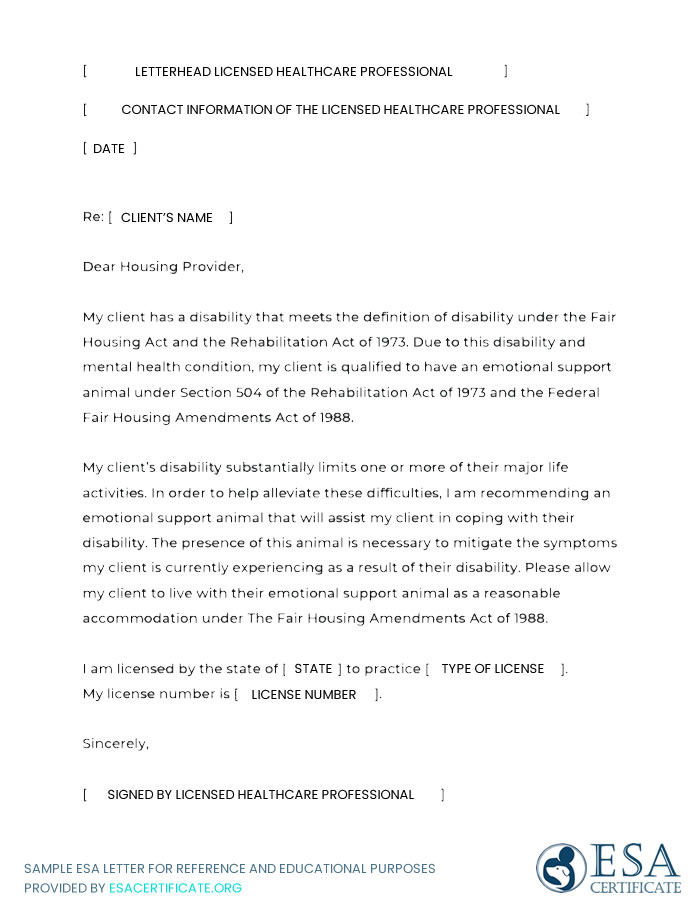When you have an emotional support animal (ESA) and the proper documentation, then you are offered protection under some specific rights under federal law in terms of housing. The Fair Housing Act and the guidelines issued by the U.S. Department of Housing (HUD) make sure that the ESA owners shouldn’t get discriminated against because of their requirement for an emotional support animal. To verify that an animal is an actual ESA, landlords will require a tenant to provide “appropriate supporting documentation” that has been acquired from a licensed healthcare professional, which is known as an “ESA letter”.
An ESA letter will offer a lot of benefits to the owner of an emotional support animal, which is as follows:
- It allows the animal to live in the buildings even if they prohibit pets.
- It makes the ESA owner free from any sort of pet fees and deposits.
- It prevents a landlord from objecting to an ESA, especially because of factors such as its weight or breed.
There are, however, some limitations to this – for example, a landlord can refuse an ESA to be allowed in a building if it is considered dangerous or poses a health risk to any other existing residents.
In this article, we will cover the important information about the guidelines to know what should be included in an ESA letter. We will also talk about how you can easily qualify for an ESA letter for housing through ESA Certificate.
Who can issue an ESA letter for housing?
Based on HUD’s guidelines, an ESA letter for housing must be obtained from a “licensed healthcare professional”. ESA letters are usually acquired from mental health professionals such as social workers, psychologists, psychiatrists, and counselors. Along with them, other people such as physicians, nurse practitioners, nurses, and physician’s assistants also have permission to issue ESA letters under HUD letters.
Most people wonder whether if it’s okay for an online professional to issue an ESA letter. Well, it is indeed allowed and actually has been approved under HUD’s guidelines. HUD acknowledges that a legitimate ESA letter will come from a licensed healthcare professional, who provides services remotely including the internet. Due to the COVID-19 pandemic, more people have been opting for remote providers and telehealth for taking care of their mental needs.
NEED HELP? WE’RE HERE
What should an ESA housing letter contain?
An ESA letter for housing should consist of the information provided below:
- Tenant’s name
- Name of the healthcare professional, their contact details, and the license number.
- The type of emotional support animal required by the tenant, i.e., dog, cat, hamster, fish, bird, etc.
Basically, an ESA letter would have to confirm the tenant’s requirement for an emotional support animal. The letter should demonstrate the following:
- The tenant has an impairment that restricts them from doing at least one major activity. Some of the conditions that qualify for mental health impairments are depression, anxiety, PTSD, and other types of phobias.
- The tenant needs an emotional support animal to get relieved from the symptoms or effects of the tenant’s condition.
Additionally, an ESA letter must always be signed and dated by a licensed mental healthcare professional. An ESA letter can also be in a digital form, which can be a PDF or a hard copy. There is no necessity to produce a printed hardcopy, and most therapists (especially online therapists) will issue letters digitally.
What can be excluded in an ESA letter?
Tenants have a right to confidentiality when it comes to declaring the specific nature of their particular condition that requires an emotional support animal. The information regarding a person’s mental health history can actually be a delicate as well as a sensitive issue. Therefore, Fair Housing rules offer tenants a right to privacy concerning such personal information.
When it comes to disclosing sensitive information, HUD has declared the following information: “Disclosure of details regarding diagnosis, the severity of a disorder, medical records, or medical examinations won’t be needed”.
Landlords are not at all allowed to ask for specific details related to a tenant’s condition or request their medical records. Healthcare professionals are bound by the ethical rules that they should keep their client’s information confidential. For such reasons, an ESA letter won’t be containing any of the particular details about your condition. ESA letters can look a bit unreal to people who are not familiar with them. The main reason for this is because of the healthcare professionals’ policy to protect their client’s information.
Does an ESA letter need to be following a landlord’s form?
Actually, the answer to this particular question is ‘No’. It has been made clear in HUD’s rules that landlords cannot demand a tenant to have their ESA documentation follow the specific set of rules set by them (landlord). The necessary documentation required by a tenant to obtain accommodation for their ESA is just a valid ESA letter and other information under HUD’s guidelines.
Does an ESA letter have to be notarized or be containing a sworn statement?
No, landlords cannot insist that a healthcare professional should notarize documents or make statements under the penalty of violation of a rule. Just a signed digital/physical copy of an appropriate ESA letter on the healthcare professional’s letterhead is enough.

Can a Certificate, ID Card, or Registration be used instead of an ESA letter?
Certifications, ID cards, or Registrations won’t suffice as valid substitutes for an ESA letter for housing. These aren’t even required if the tenant has a valid ESA letter. HUD’s rules particularly state that people (tenants) should be aware of companies that sell registrations and certificates for having emotional support animals. Even though ID cards are unnecessary, tenants wear one anyway so that other residents in the building might know that their animal companion is an ESA, which has special privileges. It should be considered that just an ID card won’t be enough to use as a substitute instead of an ESA letter.
Are there any specific requirements for ‘Unique’ animals?
HUD recognizes that animals of a smaller size, which can be domesticated, which are usually kept in a home for pleasure instead of commercial purposes can become emotional support animals. A few examples of such types of animals include dogs, cats, birds, rabbits, hamsters, fish, and other small animals that people usually keep at home as pets.
Some types of exotic animals such as goats, pythons, etc., can also be kept as emotional support animals, however, these types of animals will require a higher amount of documentation along with a lot of time & effort, when compared to the traditional ESAs. In the case of unique animals, there should some additional context that implicates the tenant’s need for a unique animal. Some other specific details might also need to be entered which won’t be necessary for a standard ESA housing letter.
Does an ESA letter require the name of an Emotional Support Animal?
An ESA letter for housing should verify the type of ESA that you have, such as a dog, cat, bird, etc. Yet, there is no need of identifying the specific animal. Most ESA letters are issued before the person actually adopts an emotional support animal. Healthcare professionals don’t have the authority to suggest a specific type of animal that should be adopted by a person, they can only estimate whether or not an ESA recommendation is necessary for a person.
Where can I get an ESA letter for housing?
If you are interested in acquiring an ESA letter for housing, you should consult a doctor or a therapist in order to discuss this matter. In case you don’t have a therapist or doctor, or if your healthcare professional is not familiar with the ESA letters for housing, then ESA Certificate can be able to connect you with a licensed healthcare professional specialized in the aspect of ESAs. The licensed healthcare professionals in our network have a great amount of knowledge about ESAs for housing. Therefore, they can provide you with an ESA letter, which can later be submitted to a housing provider by the tenant qualified for an ESA.
Sample for an ESA housing letter
The letter provided below is a good example of an ESA letter used for housing. Nonetheless, it is strictly given for educational purposes and must have been provided by a mental health professional with a valid license, who can create an ESA letter for a client.


